Kendall - Private Detective - Box Set Read online
Mystery Box Set
John Holt
The Mackenzie Dossier 3
The Marinski Affair 370
Epidemic 728
The Mackenzie Dossier
John Holt
Phoenix Publishing – Essex – UK
© August 2012 - John Holt
Conditions Of Sale
John Holt has asserted his right under the Copyright, Designs and Patents Act 1998 to be identified as the author of this work.
All rights reserved. No part of this publication may be reproduced, stored in a retrieval system, or transmitted in any form or by any means, electronic, mechanical, photocopying, scanning, recording or otherwise, without the prior permission of the publisher, except by a reviewer who may quote brief passages in a review to be printed in a newspaper, magazine or journal.
This book has been sold subject to the condition that it shall not, by way of trade or otherwise, be lent, resold, hired out, or otherwise circulated without the publisher’s prior consent in any form of binding or cover other than that in which it is published and without a similar condition including this condition being imposed on the subsequent purchaser. All characters in this publication are fictitious and any resemblance to real persons, living or dead is purely coincidental.
British Library Cataloguing in Publication Data .
A CIP catalogue record for this book is available from the British Library
Printing History
First published as “The Mackenzie File” by Raider Publishing International, New York, in August 2008.
This second Edition was published by Phoenix, Essex, UK, in August 2012
Preface
The story that follows is totally fictitious. All places and persons included in the story are totally imaginary, and any similarity to actual persons alive or dead, is totally co-incidentally, and un-intentional.
All towns, and places within those towns are imagined. They have been merely created for my own purposes, i.e. to serve the needs of this story.
My thanks go to Maxim Popenker from www.world.guns.ru for the photograph used on the front cover.
My thanks also go to Michael and Barbara Morton for their un-tiring work in checking the formatting of the manuscript.
I am grateful to Lauren Ridley, Cherryloco Jewellery for allowing me to base the Phoenix logo on her design
John Holt
Dedication
Dedicated to my wife, Margaret,
and my daughter Elizabeth.
For their support and love.
Chapter 1
Ian Charles Duncan
Ian Charles Duncan was a self-made man, who had worked his way up, from nothing. He was the only grandson of a Scottish immigrant, Angus Duncan, who had arrived at Ellis Island when he was just twenty-two years old. With him were his young wife, Moira, and their three months old son. Full of hope and optimism, they had long planned a new life, in a new land. Soon, however, their dreams were shattered. The so-called Land of Opportunity proved to be barren. The streets were not paved with gold, at least not for them. Angus had never quite been able to realize the American promise, the American dream. He had never made his fortune. He hadn’t even come close. Indeed most of the time he had been unemployed, and penniless. Worse still he would often be deep in debt. He had often resorted to petty crime, at which he was spectacularly unsuccessful. As a consequence he had spent much of his time in prison.
During one such period his wife had died. She had been living in a rundown tenement block on the east side. It was cold, and damp. She developed tuberculosis, and died within a few days. She was only twenty-seven years old. Angus took to drink, and drifted from one dead end job to another. Eventually, when he was almost fifty years old, he had found a small job working in a factory, as a janitor. It wasn’t much, but in view of his record it was certainly the best that he could hope to get. At least it brought in a regular pay check, which paid the bills, and placed food on his table. Slowly he began to settle down into something resembling a normal, albeit lonely, life.
* * *
At about that same time Ian Duncan’s parents had both been killed in a car crash. A teenager driving a stolen car had emerged from a side street directly in front of their car. They had swerved to avoid it, skidded, and driven straight into a brick wall. The gas tank erupted, and the car had burst into flames. They were trapped, and had died instantly. The teenage driver knew nothing about it. He had continued to drive on completely oblivious, until eventually the police caught up with him on the outskirts of the town. He was sentenced to five years in prison for robbery. Three years later he was back on the roads, still driving stolen cars.
Duncan was only fourteen years old when it had happened. He was left with virtually nothing. There had been a small insurance policy, but that was all. The bulk of the money went to pay the funeral expenses, and paying off a number of his father’s outstanding debts. Duncan had then been sent to live with his grandfather Angus, much to his grandfather’s annoyance. He had told Duncan that he wasn’t running a charity for orphans. Funds were tight, money was short, and so he would therefore be expected to help out with the family income and expenses.
“You better pull your weight,” he was told. “In other words don’t expect too much from me, because you won’t get it.”
To all intents and purposes, even at that tender age, Duncan was virtually left to his own devices. Certainly he had a bed in which to sleep, and a roof over his head, for which he was dutifully grateful. However, for everyday living he was expected to make his own way, to fend for himself.
“Get a paper round,” his grandfather had glibly suggested. “Or become a delivery boy.”
* * *
Fortunately for him, Duncan was, if nothing else, resourceful. He had made his first real money while still at school, from buying all manner of things from his school friends, and then re-selling them. The word friend was, in reality, a poor description, for they were not friends at all. Indeed they were anything but. Duncan would bully them into selling things cheaply. He would then bully them into buying things at a much higher price. In many cases they bought back the same things that they had been persuaded to sell. He never actually did the bullying of course. He wasn’t really built for that kind of thing. He was more the brainy type. He did the planning, and left the physical part to others far better suited to the task. In this regard he had a small team of assistants, three in total, who were well paid for their services, out of Duncan’s not inconsiderable income.
Now, forty years later, things hadn’t changed a great deal. He still bought things cheaply. He still sold things at a high price. Only the type of merchandise had changed, together with the actual scale of the operation. He still had a small team of bullies, henchmen, who were paid handsomely to do his dirty work for him. A little persuasion somewhere if it were needed. Maybe undertake a little negotiation with a difficult contact somewhere else, if necessary. Perhaps arrange for a little insurance for that special item.
In recent times Duncan had added another little service. If required he could always arrange for a small loan to be made available, at very competitive rates.
* * *
Ian Charles Duncan was seated in his large plush office, located on the nineteenth floor of the central building in The Warren Center. On the dark mahogany desk in front of him were a number of files and several papers neatly piled to one side. On the right hand corner of the desk was a silver picture frame. The faded photograph showed a young couple and a child on a beach. Close by was a large dark blue, leather bound diary. It was lying open, the blue marker ribbon draped neatly across the page. The entry for the day simply read “4
.00 pm, Frank Reynolds and John Mackenzie.” It was underlined in red. Underneath was written a second entry “8.00 pm, Veterans Hall, John Mackenzie.”
Duncan’s huge leather swivel chair was turned away from the desk, and he was facing toward the window. He was slightly hunched forward in his chair, staring down to the street level below. He had been there for a little over ten minutes. Suddenly he sat back, and swung his chair around violently. He was beginning to get impatient. He was beginning to get agitated. He was beginning to get angry.
He looked over at the wall clock. It was just after four thirty-five. He turned his chair into the desk. He began drumming his fingers hard on the desktop. The drumming gradually became faster and faster; gradually getting louder and louder. He reached across the desk and pressed the intercom button. It was answered instantly.
“Are they here yet Jackson?” he asked.
“Not yet, I’m afraid, sir,” came the nervous reply. “I’ll call you as soon as they arrive, sir.” The line went silent.
Duncan flipped the off switch. He hit the desk hard with his fists, and stood up, pushing the chair backwards, into the wall. He started to pace the floor. As he did so, he continually flexed, and un-flexed his fingers, cracking the joints.
“Where are they,” he shouted.
He suddenly stopped pacing. Take it easy, Duncan, just calm down, there’s no point giving yourself a coronary. They’re just not worth it. He looked at the clock once again, and sat back down. How could he remain calm? There was just too much at stake. Tonight was far too important. He began drumming his fingers once again. Once more he looked towards the clock.
Duncan was expecting two men, two very important men. Sure, they were important, Duncan had to admit that. They were extremely important. No question about it. But they weren’t that important that they could keep him waiting. He raised his fist and hit the desk once again. He lashed out and sent the neat pile of papers crashing to the floor. The vibration caused a number of pencils to topple from the desk tidy. They slowly rolled along the desk, and then dropped over the edge to the floor below.
“Who do they think they are?” he asked nobody in particular. “Who do they think they are dealing with?”
He stood up and walked to the door. He placed his hand on the handle and started to turn it slowly. The door opened slightly. Instantly he changed his mind. He slammed the door closed, and quickly returned to his desk. He looked at the clock yet again. I built them up. I’ll tear them back down again if I have to. Without me they were nothing. Without me they’ll be nothing once again.
There was a tap on the door. Then it slowly opened, and a young man entered into the room. He shuffled from one side to the other. He coughed once or twice, clearing his throat. “Did you want something, sir?” he asked. He suddenly noticed the papers lying on the floor. He walked over to the desk, bent down, and began to pick them up.
Duncan looked up, and glared. “Leave them, and get out,” he screamed angrily. “Get out.” He picked up the paperweight and prepared to throw it. It slipped from his hand, hit the desk and rolled on to the floor. The young man did not need to be told twice. He dropped the papers back on to the floor, and hurriedly left the office, carefully closing the door behind him.
Did I want something? Of course he wanted something. He wanted those two men. And he wanted them here, in his office, now.
Duncan was not good in this kind of situation. He didn’t like to be kept waiting. He didn’t know what to do about it. It grieved him to admit that there was actually nothing he could do about it. It was completely beyond his control. He didn’t like that either. He wasn’t used to it. And that hurt. That hurt badly. He felt strangely vulnerable, insecure. He needed to be in control. He couldn’t handle any situation that he did not control absolutely.
But there was something that he could do, some action that he could take. Not right at that moment, he knew that. He would have to wait a little while. Not too long perhaps, then he would be able to do something. Everything came to those that wait.
Just bide your time, Duncan. Then he would strike, when the time was right. “I can bring them back down again, if necessary,” he said quietly. “I can destroy both of them.”
It all came back to the one thing, control. That was the key, the major consideration. He looked at the clock once again. It did nothing except to remind him of how late they were. To remind him of how long they were keeping him waiting.
* * *
Duncan looked at the note pad lying open in front of him. He flipped over the page, and started to doodle. “P O W E R” he wrote across the middle of the page, in large flowing capital letters. He then underlined the letters several times. Next he wrote down two names, “Governor Frank Reynolds; Senator John Mackenzie.” He then struck a thick line through the middle of each name.
Certainly he would dispense with them whenever they were of no further use. “As easy as that,” as he struck another line through the names. “Eliminated, wiped out, obliterated, gone, no more, destroyed.” As he said each word, he struck another line through the names. “Removed, cancelled, erased, deleted.”
More lines went through the names cutting deep into the page, and the sheet below. “Dead.” Another line was etched across the words. He continued to stare at the paper in front of him. Then just above the word POWER he added the word ABSOLUTE.
He stopped for a moment. What was that saying, he asked himself, the one about power? How did it go? It was something about greed? No, not greed, it was something about corruption.
A few moments went by. “I remember,” he announced. He started to write it down as he spoke. “Power corrupts.” How true that was. “Power corrupts,” he repeated. “And Absolute Power corrupts absolutely.” That was it. He read it through once again. My sentiments exactly, he murmured, and then he started to laugh. Then he abruptly stopped, and angrily tore the sheet from the pad. He tore the sheet into several pieces and threw them towards the paper bin. He missed the target, and the shreds fell to the floor.
He looked back at the clock. Where were they? No matter what he thought he knew that for the time being he needed those two men. Just for the time being he had no choice. He didn’t like that either, but once again there was nothing he could do about it. Not right then.
* * *
Duncan Enterprises Incorporated was located at the Warren Center, in the middle of the town. This was also home to Duncan Construction; Duncan Services; Duncan Imports; Duncan Exports; and a handful or so other companies owned and managed solely by Ian Charles Duncan. Companies involved with transportation, construction, financial services, and trade amongst their major activities. Also in the building were a number of other smaller companies in which, although Duncan did not have control, he did have a large stake. One such company was Latimer Holdings, a small real estate business.
For tax purposes the complex had actually been constructed under the name of Dave Warren Construction. At one time Dave Warren had been Duncan’s business partner. Seven years ago he had been found dead in his office. It was Duncan who had actually found the body. Lying on the desk in front of him was an empty bottle. The bottle had originally contained Tylenol tablets.
Naturally there had been an inquiry. Duncan claimed that his friend’s death had been nothing more than a tragic accident.
“Certainly Dave had been having dreadful migraines just lately. Too many late nights, I’m afraid. I had told him to take it easy,” Duncan had told the Coroner at the Inquest. “He was taking a lot of tablets. But I’m sure that he never realized how dangerous it was to take too many. He probably never even realized how many he had taken. When you are in such pain maybe you don’t think straight.”
Duncan’s comments were duly noted, and recorded. Ultimately, however, they were rejected by the Inquiry. “Mr. Duncan, the possible effect of exceeding the recommended dose of Tylenol is well known. Furthermore, it is clearly shown on the bottle,” the Coroner responded. “Would you not agree?”
he asked Duncan, as he handed the bottle to him.
Duncan looked closely at the bottle. He turned it around, and read the small print on the back. It was there, clearly visible, in black and white. “No more than eight tablets to be taken within a twenty four hour period.” He had to agree that it was plain enough. Duncan also had to agree that it would have been so unlike his partner not to take notice of instructions like that. He was usually so methodical, so cautious. He would check, and double-check, everything. Then he would check again. He never did anything without being absolutely certain. The accidental overdose idea was beginning to look more and more unlikely.
After two days deliberation, the Inquiry had reached a decision. The official verdict was that Mr. Warren had committed suicide while the balance of his mind was disturbed. Apparently he had been falsifying the business accounts. Duncan could not believe it. There was no way that his partner - his friend - could possibly be guilty of embezzlement. It wasn’t in his nature. The thought of anything illegal was quite abhorrent to him. He was the most honest person you could find.
Duncan vowed that he would prove, conclusively, that his partner had not been involved in fraud. He would fight to clear his name. It was the least that he could do. He instigated an independent investigation into the company’s accounts. Duncan himself was most co-operative. Files, documents, everything was placed at the disposal of the investigation team. The Company’s books, the check stubs, bank statements. Nothing was hidden, and nothing was withheld. No matter how trivial.
“As long as we arrive at the truth,” he stipulated. “That was the most important thing, the truth.”
* * *
After six months, the investigation was completed, and a report issued. The report, which ran into several hundred pages, showed, quite clearly, that all of the allegations were indeed true. Duncan was shocked. Warren had apparently deliberately altered certain figures in the accounts. Large un-authorized sums of money had been withdrawn. There had been dozens of transactions, over a considerable period of time. There was also evidence of insider dealings on the Stock Market. Tax records had been altered. Some records had been deliberately destroyed. The evidence was overwhelming. There was no error. Nonetheless, Duncan still could not believe it.

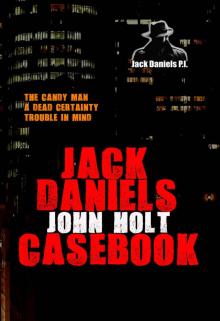 Jack Daniels - Casebook
Jack Daniels - Casebook A Case Of Murder (Kendall Book 6)
A Case Of Murder (Kendall Book 6)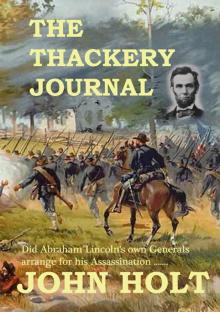 The Thackery Journal
The Thackery Journal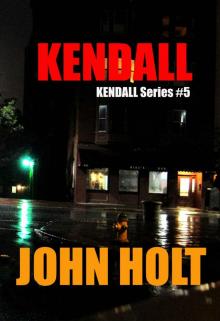 Kendall (Kendall Book 5)
Kendall (Kendall Book 5) Kendall - Private Detective - Box Set
Kendall - Private Detective - Box Set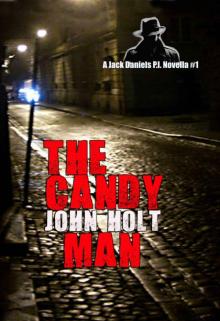 The Candy Man: A Jack Daniels P.I. Novella #1
The Candy Man: A Jack Daniels P.I. Novella #1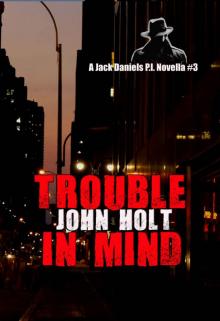 Trouble In Mind: Jack Daniels P.I. Novella #3
Trouble In Mind: Jack Daniels P.I. Novella #3 The Kammersee Affair
The Kammersee Affair